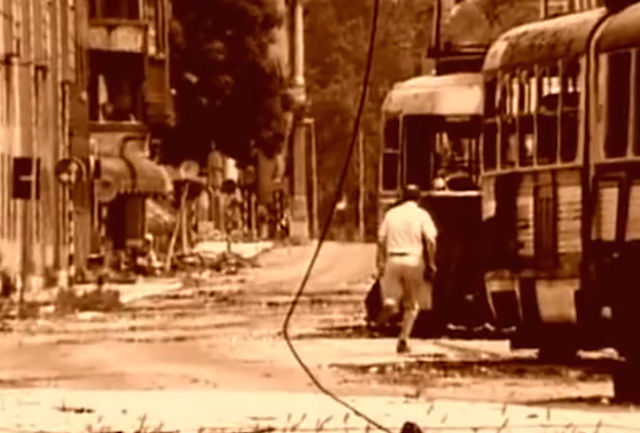SUMMARY: Will be phasing out "summary" feature.
Audio option not available.
I admit the title of this post is rather macabre. "Bombs Fall, I Go Where?" It came to me while drafting a post on the siege of Sarajevo. I was enrapt by a photo of a man running along a bombed out boulevard in broad daylight. The infamous sniper alley. This photo here:
 |
| Sarajevo, Bosnia-Herzegovina, c. 1993 (source: unknown) |
Nowadays, news of Syria's civil war, of Yemen, of Iraq are part of the psyche-bruising mix. My Twitter feed of needy humanitarian agencies representing vulnerable children and women have left their mark, too. Then there are the countless recollections of human cruelty by filmmakers and writers: world wars, genocides, bloody coups that long ago plunged a corner of my heart into darkness. My mum would agree that I am sometimes macabre. But to return to the question at hand: Where would I go, if bombs began to fall? And to further ask: Who would shelter me? How would I survive? Would I survive? Who would remain? You see, introspection often follows bad news, and it's certainly no different today.
Yesterday, a deadly terrorist attack in Dhaka, Bangladesh, where I lived from 2012 to 2013, took place. This morning, I'm urged to take my thought experiment - those hypothetical "bomb-falling" questions -- to some kind of conclusion. Beneath (or beyond?) the sadness and anger lies the need to feel more prepared, as if I were now -- more than any other time -- susceptible to danger, which, according to crime experts, I'm not. My preparations involve dwelling on death: imagining, evoking, playing over possible scenarios in my mind. This mental habit performed in relative safety and often quietly, inwardly, keeps the notion of life's fragility close. Maybe too close. Forgive me if I sound trite. I've simply come to understand this: Why wouldn't bombs fall on me -- on us? If they haven't already, it's probably just a matter of time. Whether they be literal bombs or deathly devices of another kind (e.g., machetes, bullets, stones, a speeding car), I think my reader catches my drift: the degrees may vary but we're all vulnerable. Whether it be taken by sickness, accident or bomb, life must be honoured.
My flat was in Gulshan, the posh Dhaka neighbourhood where Islamists murdered more than twenty people inside Holey Artisan, a popular lakefront restaurant. It was an oasis of calm in a clamouring, crowded, dusty city. This much I can tell from the pictures. I'd have been a regular at Holey, arriving after work by in my Toyota sedan to daydream in the expansive garden. Having no grasp of Bengali, I'd order coffee in English with my "regular" waiter, and recline in the thinly-padded wrought-iron chair, newspapers or books in hand. I'd occasionally wish I had company to discuss the news and avert the gaze that falls upon a lone woman dining out. But now, three years on, Gulshan's relative peace has been horribly disturbed. Caught in a terrible tragedy were patrons who were simply partaking in what is so ordinary -- almost mundane: an evening out at the local eatery.
My flat was in Gulshan, the posh Dhaka neighbourhood where Islamists murdered more than twenty people inside Holey Artisan, a popular lakefront restaurant. It was an oasis of calm in a clamouring, crowded, dusty city. This much I can tell from the pictures. I'd have been a regular at Holey, arriving after work by in my Toyota sedan to daydream in the expansive garden. Having no grasp of Bengali, I'd order coffee in English with my "regular" waiter, and recline in the thinly-padded wrought-iron chair, newspapers or books in hand. I'd occasionally wish I had company to discuss the news and avert the gaze that falls upon a lone woman dining out. But now, three years on, Gulshan's relative peace has been horribly disturbed. Caught in a terrible tragedy were patrons who were simply partaking in what is so ordinary -- almost mundane: an evening out at the local eatery.
(To be continued.)
No comments:
Post a Comment